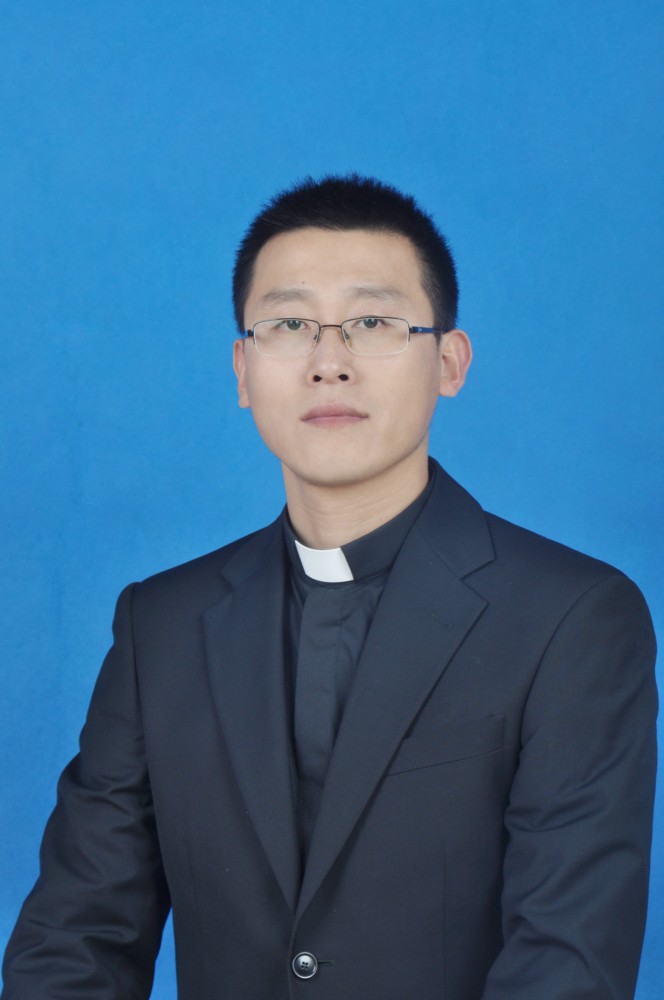Zhand Yulai is a young Chinese priest who for studies stayed in Rome with the SCJs of the International College. Before returning to China, he told us about his vocation, his way of seeing SCJs, and the prospects of the Catholic Church in the People's Republic of China.
We know how China today is a great challenge not only in terms of world political and economic balance, but also for its relationship with religion. How was your vocation born?
As for the birth of my vocation, I should start with the story of my childhood. I was born into a family who had been Catholic for several generations. My parents and grandparents are faithful practitioners, and in the village where our family is located there are 500 Catholics. Compared to the rest of our area, Catholics there are relatively concentrated. In recent decades, since the establishment of the People’s Republic of China in 1949, our village has never had a priestly vocation, and the Christians in the village find it very shameful that so many faithful remain without a priest. As a child, I often went to church with my parents and grandparents. Around the age of ten, I was always an altar boy, so the faithful often commented on my fervor as a sign of my vocation to be a priest. In addition, there was also the influence and encouragement of the parish priest and nuns, so that the seeds of vocation have sprouted since I was a child.
After elementary school, when the minor seminary of the diocese opened for the enrollment of students, some faithful from the village helped me prepare the documents to enter the seminary. What I did not expect when I told my parents was that they were not happy, especially my mother, who tried to discourage me. It should be known that in traditional Chinese culture, it is very important for family to continue to live over time through the marriage of the male child. But as the only male child (I have only one sister), if I became a priest, the continuity of the family would cease, very miserable from the point of view of traditional Chinese culture. Moreover, in a peasant family, the male child must provide for the sustenance of the family itself and of parents in their old age. However, while understanding their reluctance, especially the tears of my mother, who wept for a few years, I did not compromise. For a boy of fourteen or fifteen, it is a wonderful thing to make such a decision and to persevere in it despite the resolute opposition of family members This further confirmed to me that my vocation comes from God: “you did not choose me, but I chose you” (John 15:16). My parents, while verbally objecting, as faithful practitioners did their best to give me their material help and other necessary support for the seminary. Their attitude slowly changed and passed from opposition to total support. After six years in the minor seminary, philosophy and theology in the major seminary, and the studies in Rome for the license in canon law, I received the crown of the priesthood. My parents fully shared with me the joy of my priestly ordination.
For three years you lived in Rome with the Dehonian community. How have these years been?
It is a great honor to live in the Dehonian community since 2017, where I had the opportunity to know the charism of the congregation. In the community I learned and experienced many excellent virtues, for example tolerance and acceptance. In the Generalate, the members of the community come from all over the world. Each has their own culture and background, so the way of thinking and acting is also different, yet here everyone lives by implementing mutual welcome, tolerance and acceptance. These qualities are exactly those that the Chinese people need to rediscover and that I particularly appreciated here. Furthermore, life in the community with Holy Mass, Eucharistic adoration and fraternal dialogue have helped me in this formative and challenging period of study, to deepen my knowledge and walk with God and many brothers. I believe these experiences will benefit me throughout my life.
Your stay in Rome had a reason: the doctoral research in canon law on “marriage with disparity of cult”, where you tried to offer a historical perspective. What are the current challenges for you in this area?
 In considering the current challenges in the field of marriage with disparity of cult, that is marriage between a Catholic and a non-baptized person, we cannot ignore elements that “photograph” the situation of potential fragility and crisis to which these marital unions are exposed. There are factors of cultural matrix, and external factors, linked to the previous and typical tradition of different environments, which can influence and create challenges in this field. The challenges in the Chinese environment have these aspects:
In considering the current challenges in the field of marriage with disparity of cult, that is marriage between a Catholic and a non-baptized person, we cannot ignore elements that “photograph” the situation of potential fragility and crisis to which these marital unions are exposed. There are factors of cultural matrix, and external factors, linked to the previous and typical tradition of different environments, which can influence and create challenges in this field. The challenges in the Chinese environment have these aspects:
The challenge of different beliefs. Among the various problems that couples with disparity of cult face, the difference in customs and religion precisely represents the greatest challenge, because their marriage involves the union not only of different ways and lifestyles, but above all of religious beliefs so different that they can put a strain on the union and stability of the couple.
China is a country of ancient culture, with customs and habits, sometimes superstitious, some of which are in conflict with Catholic doctrine. We must not forget the great suffering of the Chinese Catholics during the “controversy of the Chinese rites”, during the centuries in which the Church forbade them to participate in their traditional rites because they were considered superstitious. Today Chinese Catholics have transformed their customs under the combination of traditional culture and the Catholic faith, in order to obey the law of the Church and have fundamental relationships with the unbaptized around them. However, marriage between a Catholic and an unbaptized person creates many conflicts between the different customs and doctrines, especially when the baptized party is a woman. With few exceptions Chinese marital culture involves the wife entering her husband’s home. Even if the woman is baptized, when entering the house of her unbaptized husband, she must adapt all customs to those of her new family. Many problems arise when it comes to superstitious rites not permitted by the Church .
The indissolubility of marriage. Marriage is indissoluble and includes unity and mutual fidelity (can. 1056). But in China, the national marriage law allows for divorce if voluntarily requested by both spouses. In recent years, traditional Chinese society has transformed from agricultural to industrial and the consequent social changes have also led to a transformation of mentality. The Chinese are now paying attention to the affirmation of individualism and the selfish fulfillment of particular desires. This especially concerns the new generations who have abandoned the traditional conception of marriage by claiming an independent and personal choice of partner and married life. Therefore, in Chinese society “divorce” is no longer an execrable event as before. On the contrary, the disintegration of the family is considered a common social phenomenon.
Even for Chinese Christians, the increase in the number of divorces is evident, but in any case it is much lower than that of non-believers. Even if they encounter difficulties or conflicts, the spouses maintain their married life and avoid divorce, strengthened and dissuaded by their parents and priests. But for marriages between a Catholic and an unbaptized person, if there is a marriage problem, the non-believing party will prefer to divorce and choose to remarry.
Baptism and the education of children. Baptism and the education of children are problems that most involve the couple, especially when the union takes place between a Catholic and an unbaptized person.
In general, the responsibility for the education of children is the responsibility of both parents, who have the mutual duty of understanding and respect for the other religious denomination. If one is atheist there must at least be mutual recognition of rights of conscience. In addition to the existence of just and reasonable cause, the code of canon law makes the release of the dispensation subject to compliance with certain conditions, corresponding to the assumption of specific commitments by the Catholic, who must promise to do everything in their power to baptize and educate the children in the Catholic Church. The other party must be promptly informed of this promise. (cf. can. 1125).
The greater the juridical-religious differences on the Catholic side, the greater will be the risk of failure to fulfill the prescribed guarantees. It could happen, due to political or cultural circumstances not dependent on the will of the Catholic side, that the children are not in fact educated in the catholic faith.
There is another point to emphasize: parents in China are very important for the religious education of children, because once they enter the school, they receive a totally atheistic education. In fact the Chinese government, communist and atheist, prohibits any religious teaching in the school, and the didactic material and the books published are all against religion. In a family where one spouse is Catholic and the other is not baptized, even if the children are baptized on the behest of the Catholic parent, they will likely become atheists if there is a lack of religious education within the family.
However, such marriages represent not only a challenge but also a precious resource for the Church. In fact, there have been cases in which, after marriage, not only the unbaptized spouse, but also his own relatives and friends are baptized. In short, what is commonly a challenge can be transformed into a new method of evangelization.
Thinking about the church in China, we know how Pope Francis was very attentive to dialogue with the Chinese People’s Republic. In 2018 – not without controversy – a provisional agreement was signed between the Holy See and the People’s Republic of China, which provided for two years of probation. What do Christians in China think of this path and dialogue?
Since the beginning of his pontificate Pope Francis has repeatedly shown a lively and cordial attention to the Chinese people, contributing to the establishment of a new and more relaxed climate, which allows the effective resumption of the Holy See’s dialogue with Chinese authorities. As a result of a process of gradual and mutual rapprochement, on September 22, 2018, the signing of a provisional agreement between the Holy See and the People’s Republic of China on the appointment of bishops was announced . It is provisional in nature as it provides for periodic evaluations of its implementation. On the same day it was announced that the Pope readmitted the eight official bishops ordained without papal mandate (one of whom died in 2017) into full ecclesial communion.
The encounter can only be authentic and fruitful if it takes place through the practice of dialogue, which means knowing each other, respecting each other and “walking together” to build a common future of higher harmony. This Provisional Agreement, while limiting itself to some aspects of the life of the Church and being necessarily imperfect, can contribute to writing this new page of the Catholic Church in China. Through this path, the Holy Father hopes to realize the spiritual and pastoral purposes proper to the Church, that is, to support and promote the proclamation of the Gospel, and to achieve and preserve the full and visible unity of the Catholic community in China.
But the situation for the Church in China is not entirely positive. Indeed on February 1, 2018 it became more radical with the launch of the new regulations on religious activities. With the new regulations, the official communities must submit to the control of even the dimensions, colors and position of crosses, the height and position of statues, the texts posted on the internet, and the prohibition of broadcasting any ceremony by live streaming. Underground communities must absolutely not exist.
Furthermore, young Catholics under the age of 18 were forbidden to participate in Christmas mass, Sunday mass, and catechesis. In elementary, middle and high schools, the representatives of the ministry of education have prohibited schoolchildren and students from celebrating Christmas, giving gifts, and participating in religious ceremonies. Christmas celebrations and decorations have been banned in the cities. These have been called “an aggression against Chinese culture”, and a submission to the “spiritual pollution” of the West. Because of this, many communities have been forcibly closed, and convents and places of worship bulldozed. There are also (official) churches that have been destroyed in the name of town planning and their lands seized without any compensation for building developments.
Furthermore, immediately after the signing of the agreement, in many regions of China the United Front and the Patriotic Association held meetings for priests and bishops in which it was explained that despite the agreement, they had to work for the implementation of an Independent church. The destruction of crosses, churches, indoctrination sessions, and arrests continued as before.
Although the provisional agreement between China and the Holy See has not changed this situation, it is somehow an achievement, given that for the first time in the history of modern China the Pope is recognized as the head of the Catholic Church. Perhaps this shows that the agreement is a step on a possible path and that we can certainly walk, even if not everything is resolved and the situation is certainly not ideal.
In your final greeting in the magazine of the International College “Our Fruit” you wrote: “Now, close to leaving, I wish to continue to feel personally bound and united in prayer to the Dehonian Congregation”. Why is it important to you to maintain this bond? How do you feel enriched by this experience
With the opportunity to live in the SCJ community, I have had a very precious experience, a unique, enriching experience, as well as a great honor. Here I met and understood the charism of the Congregation, which I admire and with which I am very much in agreement. So I hope to maintain this bond with the Congregation, and even more to live this charism and be a spiritual Dehonian.
Of the various experiences that I lived here and which have greatly enriched me, I would particularly like to emphasize community life, because for political reasons, an authentic religious community life cannot yet be lived in China. This experience made me understand not only its beauty, but also its importance for our life as priests. I believe it has not only benefited me, but also the diocese in which I will work.
And let’s talk now about your future. What will your future service be?
As in the universal Church, the Church in China also has many problems in the field of marriage, and a serious organization of both pastoral care and the marriage tribunal has become not only necessary but also urgent. However, in China, the establishment of ecclesiastical courts is not an established fact, both for external reasons, linked to a less than full exercise of the right to religious freedom, and for internal reasons, especially the lack of trained personnel. In training courses for marriage, particularly wedding preparation courses for the couples, there are no priests or religious who have the necessary skills in this delicate and complex field. I was lucky enough to come to Rome to study canon law, so my future work would be in the ecclesiastical courts and in pastoral care concerning both the preparation for marriage and the accompaniment of the couple in married life.




